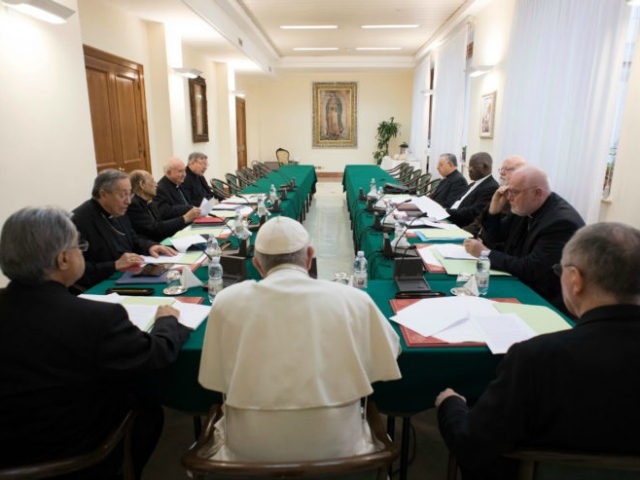Six of the nine cardinals who are members of the International Council of Cardinals have expressed “full solidarity” with Pope Francis and his handling of the church’s sexual abuse scandal.
Only six cardinals participated in the meeting of the council, known as the “C9,” on Monday, reported the Catholic Herald.
In a statement released on the first day of a three-day meeting, the six cardinals “expressed full solidarity with Pope Francis in the face of what has happened in the last few weeks, aware that in the current debate the Holy See is formulating possible and necessary clarifications.”
The council has convened as the Vatican is reportedly preparing a response to a letter released by Archbishop Carlo Maria Viganò, the Vatican’s former ambassador to the United States, which links both the Catholic Church’s sexual abuse crisis, as well as ensuing coverups by its bishops, to an extensive “homosexual network” within the church.
The six cardinals present for the meeting Monday were Cardinals Pietro Parolin, Vatican secretary of state; Oscar Rodriguez Maradiaga of Tegucigalpa, Honduras; Sean P. O’Malley of Boston; Oswald Gracias of Mumbai, India; Reinhard Marx of Munich and Freising, Germany; and Giuseppe Bertello, president of the commission governing Vatican City State.
Absent from the C9 meeting were Cardinal Francisco Javier Errazuriz Ossa, retired archbishop of Santiago, Chile, who is facing scrutiny for his handling of sexual abuse allegations; Cardinal George Pell of Australia, who is on trial in his country for sex abuse charges; and Cardinal Laurent Monsengwo Pasinya of Kinshasa, Congo.
Pope Francis created the C9 following his election in 2013 to advise him on the reform of the Roman Curia and on governance of the church.
The C9 meeting convenes as about 44,000 Catholic women have signed a letter to Pope Francis, charging him with providing an “inadequate” response to Viganò’s letter.
In his letter, Viganò charged that, as the papal nuncio to the United States, he personally informed the pope of former Cardinal Theodore McCarrick’s sexual abuse of priests, seminarians, and minors on June 23, 2013 – three months after the College of Cardinals elected Francis pope. The pope, nevertheless, “continued to cover for [McCarrick],” Viganò charged.
The former nuncio wrote that, despite being aware of McCarrick’s abusive history, Pope Francis “did not take into account the sanctions that Pope Benedict had imposed on [McCarrick] and made him his trusted counselor.”
Viganò has called upon Pope Francis to resign his office.
Catholic News Service (CNS) reported last week its receipt of a letter confirming that Vatican officials knew of allegations against McCarrick in 2000.
A top official from the Vatican Secretariat of State acknowledged allegations made by Father Boniface Ramsey, pastor of St. Joseph’s Church Yorkville in New York City, against McCarrick, the former archbishop of Newark, New Jersey.
Ramsey had been on the faculty of Immaculate Conception Seminary in South Orange, New Jersey, from 1986 to 1996 and had sent a letter in 2000 to then-Vatican ambassador to the United States, the late Archbishop Gabriel Montalvo, informing him of complaints he heard from seminarians who were students at the seminary.
Ramsey shared with CNS a letter dated October 11, 2006, from then-Archbishop Leonardo Sandri – former Vatican substitute for general affairs – who wrote to request information about a priest of the Archdiocese of Newark, who studied at Immaculate Conception Seminary and was being considered for a Vatican post.
CNS reported:
Then-Archbishop Sandri wrote to Father Ramsey, “I ask with particular reference to the serious matters involving some of the students of the Immaculate Conception Seminary, which in November 2000 you were good enough to bring confidentially to the attention of the then Apostolic Nuncio in the United States, the late Archbishop Gabriel Montalvo.”
Ramsey told CNS that in his letter to the former Vatican ambassador, he “complained about McCarrick’s relationships with seminarians and the whole business with sleeping with seminarians and all of that; the whole business that everyone knows about.”
The report continued:
Father Ramsey said he assumed the reason the letter from then-Archbishop Sandri, who is now a cardinal and prefect of the Congregation for Eastern Churches, only mentioned “serious matters involving” seminarians and not Archbishop McCarrick’s behavior was because accusations against the former cardinal were “too sensitive.”
“My letter November 22, 2000, was about McCarrick and it wasn’t accusing seminarians of anything; it was accusing McCarrick.”
While Father Ramsey has said he never received a formal response to the letter he sent in 2000, he told CNS he was certain the letter had been received because of the note he got from then-Archbishop Sandri in 2006 acknowledging the allegations he had raised in 2000.
The 2006 letter from Sandri to Ramsey “not only confirms past remarks made by Father Ramsey, but also elements of a document written by Archbishop Carlo Maria Viganò, who served as nuncio to the United States from 2011 to 2016,” stated CNS.
Cardinal Joseph Tobin, the current archbishop of Newark, New Jersey, has told priests under his leadership he has no knowledge of a “gay subculture” in his archdiocese and has instructed them not to speak to media about sexual misconduct.
Tobin’s letter to the priests of his archdiocese was written in the wake of a Catholic News Agency (CNA) story revealing new allegations of sexual abuse of seminarians and priests by McCarrick and by others in ministry within the archdiocese. The story featured the reports of six priests of the Newark archdiocese, who spoke to CNA under the condition of anonymity, regarding incidents that occurred while the archdiocese was under the leadership of both McCarrick and, later, Archbishop John J. Myers.

COMMENTS
Please let us know if you're having issues with commenting.